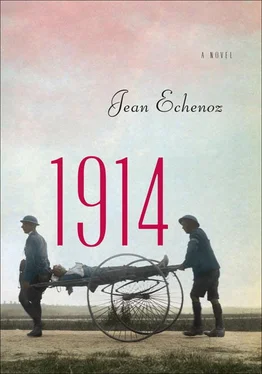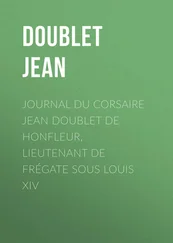Leaving at dawn the next morning, the survivors had a lot more marching to do, often through forests where they were less exposed to the enemy’s binoculars and aerial observation from aviators and observers in barrage balloons, although the often uneven terrain made progress more difficult and tiring. They were finding more and more corpses, abandoned weapons and equipment; on two or three occasions they had to fight again, but fortunately only in brief affrays that were even more chaotic but in any case less bloody than the first engagement at Maissin.
This slog lasted all autumn and became so routine that by the end they’d practically forgotten they were marching. Which wasn’t that bad, after all, one kept busy that way: the body mechanically set in motion left one free to think about something else or more often plain nothing, but the procession had to halt when the war seized up in the winter. What with all this advancing against one another until both sides found themselves unable to extend their positions, it had to happen: everything froze in a standoff during a serious cold snap, as if troop movements had suddenly congealed all along the great line from Switzerland to the North Sea. It was somewhere along this line that Anthime and the others found themselves paralyzed, bogged down in a vast network of line trenches tied together by communication trenches. This whole system, in principle, had been initially dug out by the army engineers, but also and above all by the soldiers, since the spades and picks they bore on their backs weren’t there just for show. And as time passed, by trying every day to kill the maximum possible of those across the way plus crawl forward the minimum number of yards the high command required, that’s where they plowed themselves under.
AT THE END OF JANUARY, as expected, Blanche brought a child into the world, a female, seven pounds and fifteen and two-thirds ounces, first name Juliette. Lacking a legal father—a lack all the more up in the air in that this presumed-by-everyone biological father had crashed almost six months earlier just outside Jonchery-sur-Vesle—she received her mother’s family name. So: Juliette Borne.
That the mother had had a child outside of wedlock did not cause much scandal or even provoke excessive gossip. The Borne family was not particularly straitlaced. For six months Blanche simply stayed home for the most part and then, after the birth, the war was blamed for the wedding having been postponed, Blanche acquired an engagement in public that had never privately taken place, and the infant’s illegitimacy was obscured by the swiftly heroized figure of the supposed father, wreathed in bravery and, thanks to the hurried efforts of Monteil, decorated posthumously with a medal. Even though Blanche’s father, thinking of the long term, regretted in his heart of hearts that without a male heir, the future of the factory was not assured, Juliette’s birth did not prevent this child, fatherless even before her birth, from immediately becoming the apple of all eyes.
I’ll never forgive myself, sighed Monteil; I’ll never get over this. The family had indeed hoped, thanks to the doctor’s connections, that by dodging the front Charles would be less exposed to enemy fire in the air than on the ground. The connections had worked, of course; everything had gone well: he’d been exempted from ground combat and reassigned to the newborn aviation corps—which no civilian could have imagined then would ever play an active role in combat—as if it were a cushy berth. Whereas that turned out to be a miscalculation: Juliette’s putative father disappeared even more swiftly from the sky than he might perhaps have done from the mud. I’ll always blame myself for this, Monteil continued. Maybe he would have been better off in the infantry, after all. We had no way of knowing. Blanche replied briefly that regrets were useless, no point in going on and on about it, and it mightn’t be such a bad idea if he would instead take a look at Juliette.
Who was three months old, it was the beginning of spring, and Blanche could see things budding in the trees—trees still bereft, however, of even the tiniest bird—through the window next to which she had parked the baby carriage. Forgive me, said Monteil, heaving himself heavily out of his armchair to remove the child from her carriage and examine her— respiration, temperature, alertness—and then declare that my word, she seems to be doing very nicely. Good, Blanche said to him in thanks as she rewrapped the infant. And your parents, Monteil inquired. They’re holding up well, said Blanche; it was hard after Charles died, but the child provides a distraction for them. Yes, Monteil began to ramble on again, I’ll be angry with myself forever for what I did but it was for his own good, wasn’t it. Couldn’t be helped, said Blanche firmly. And his brother, aside from that, asked Monteil. Excuse me, said Blanche, whose brother? Charles’s brother, Monteil prompted her, have you any news? Postcards, replied Blanche, he sends them regularly. And even a letter, from time to time. At the moment, I think they’re in the Somme, he’s not complaining very much. That’s fine, then, observed Monteil. Anyway, Blanche reminded him, he’s never been one for complaints, Anthime. You know how he is: he always adapts.
AS A MATTER OF FACT, Anthime had adapted. What’s more, even if he hadn’t, if he’d obviously been having trouble dealing with things and tried to tell anyone, postal censorship wasn’t a big help to anyone trying to carp. Yes, Anthime got used fairly quickly to the daily chores of cleaning, digging and earthwork maintenance, the loading and transportation of materials, as well as the periods in the trenches, the shifts of guard duty at night, the days off. These last existed in name only, moreover, consisting of drilling, instruction, maneuvers, typhoid vaccinations, showers when all was going well, march pasts, parades under arms, ceremonies such as the awarding of the Croix de Guerre, invented six months earlier, or, for example, the recent presentation to a sergeant major in the platoon of a citation for devotion to duty at the front in spite of his rheumatism. Anthime had also grown used to the relocations, the changes in the uniforms, and above all, the others.
The others were mostly but not simply peasants, agricultural laborers, craftsmen, and homeworkers, a basically proletarian population in which those who knew how to read, write, and count, like Anthime Sèze, were both in the minority and in a position to help their comrades compose letters or read those they received. The news in this mail was then passed on to anyone interested, although Anthime had kept mum upon learning of Charles’s death, sharing this only with Bossis, Arcenel, and Padioleau. Somehow, the four of them always managed in spite of all the troop movements to wind up not too far from one another.
As for changes in the uniforms, it was in the spring that new greatcoats were issued in a light blue that proved quite becoming in the newly returned sunshine. The overly garish red pants had almost disappeared, either covered by blue overalls or replaced by velvet trousers. In the defensive accessories department, the men first received cervelières, close-fitting steel skullcaps, to be worn under the kepi, while a few weeks later, in May, appeared the first sign of a not-so-jolly technological innovation: gags and goggles with mica lenses were distributed to every soldier for protection against combat gases.
Uncomfortable, always sliding off, the migraineprovoking cervelière was not a huge success; more and more of the men stopped wearing them and soon used them only for culinary ends, for cooking up an egg or as an extra soup bowl. It was in the early days of September, after the Ardennes and the Somme, [9] Ardennes and the Somme: For hundreds of years the European powers have fought over the strategically valuable region of the Ardennes, although by the turn of the twentieth century the difficult terrain there was considered unsuitable for modern warfare. Nothing daunted, in both world wars Germany struck swiftly through the Ardennes to attack where France was poorly defended. The Battle of the Ardennes (August 21–23, 1914) was one of the opening battles of World War I, while in World War II, the Battle of France and the Battle of the Bulge devastated the region once again. In the Battle of the Ardennes, the French counted on their light, rapid-firing artillery to dominate the small German forces they anticipated encountering in wooded terrain favoring their firepower, but the unexpectedly significant German forces, strengthened by their advanced tactical positioning, turned the tables on the French, who retreated in disorder with heavy casualties and were kept essentially on the defensive until the Battle of the Marne. The Battle of the Somme (July 1–November 18, 1916), one of the biggest and bloodiest battles of the war, was also one of the most deadly confrontations in history, with a butcher’s bill of more than a million casualties. The French and British armies, supported by troops from British imperial territories, mounted a joint offensive against the German army, which had by then taken considerable French territory at great cost to both sides and was pressing France hard in its siege of Verdun. Specifically developed to break the deadlock of trench warfare on the Western Front, tanks were first used in combat by the British in the Battle of the Somme, but by the time the Germans withdrew to their fortified Hindenburg Line, the French and British forces had managed to penetrate only a few miles into German-occupied territory.
when Anthime’s company had moved back toward the northeastern province of Champagne, that this skullcap was replaced by a helmet meant to provide more serious protection, yet initially painted bright blue. Putting them on, the men found it funny not to recognize one another, for the helmets obscured much of their faces. When everyone stopped laughing and realized that sunlight reflecting off this fetching blue made them all attractive targets, they slathered the helmets with mud the way they’d done with the mess tins the year before. Anyway, whatever their color, the men were not half pleased to have them during the fall offensive. Especially on one difficult day at the end of October, when wearing a helmet was no laughing matter.
Читать дальше









